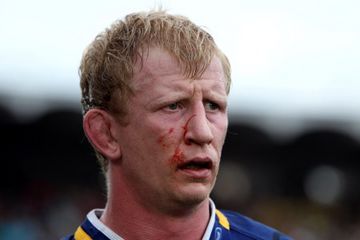Nobody has ever scaled such giddy heights so often. Leicester at the start of the century went closest, winning successive finals against Stade Français under the bluest of Paris skies in 2000 followed by Munster in Cardiff twelve months later, aided and abetted with a piece of calculated cheating by Neil Back late in the game.
While that proved to be the Tigers' lot under the command of the only European player to lift the World Cup, no captain has eclipsed Johnson's feat of winning the Heineken Cup twice. Fabien Pelous equalled it, winning 50 per cent of his four finals as skipper of Toulouse. Cullen has already done it twice, against Northampton at the Millennium Stadium last year and, ironically, against Leicester at Murrayfield in 2009.
If Leinster see off their neighbours from north of the border and emulate Leicester's back-to-back victories of ten years ago, Cullen can justifiably claim to have welded a piece of Johnson's winning mentality around Europe's No 1 team, not that the modest Irishman would dream of making such an immodest claim. It simply wouldn't be his style.
Cullen did not spend two years (2005 to 2007) with the Tigers for nothing. He arrived post-Johnson, undaunted at the remaining high-class competition for second row places headed by another World Cup winner, Ben Kay, and the younger Louis Deacon.
That Leo captained Leicester on 15 occasions said everything about what they thought of him at Welford Road. His 56 appearances for England's most successful club included one as a second half substitute for Kay when Twickenham last hosted the Heineken final, one which also featured another Leinster native, Shane Jennings.
Half an hour may not have been long enough to turn the tide against Wasps during the only all-English Heineken final. Despite being underdogs heading into the final, Wasps off the Tigers with 16 points to spare, the biggest winning margin since Alain Penaud and his all-dancing Brive ran rings round the Tigers of Dean Richards at Cardiff Arms Park 14 years ago.
No team has ever managed to win three European finals in four seasons which, if they achieve it, would put Leinster in a class of their own. The manner in which they got there, defending for their lives during the frenzied finale to a wonderful semi-final against Clermont Auvergne, showed they truly are a team for all seasons, team being the operative word.
In terms of personnel, it has not changed that much since the ice-breaking win over Leicester at Murrayfield three years ago. Barring injury, eight of the starting XV at Twickenham will be lining up for their third final, from back to front Isa Nacewa, Brian O'Driscoll, Gordon D'Arcy, Luke Fitzgerald, Jonny Sexton, Cian Healy, Jamie Heaslip and, of course, Cullen.
Surprisingly, Rob Kearney has yet to start his first final. He made the last nine minutes at Murrayfield and missed out completely last year because of injury. A grand stage to match the occasion is the least Europe's supreme full-back deserves for the series of stellar shows behind his rise as surely the player of the tournament.
Cullen, whose Leinster career stretches all the way back to 1998, will be wary of what awaits the holders at Twickenham. Ulster's self-proclaimed status as underdogs will suit them down to the ground, not that Cullen will be fooled by that. Nor will he waste a moment dwelling on the fact that Leinster have beaten their northern neighbours twice in the RaboDirect PRO12 - 42-13 in Dublin on Boxing Day, 16-8 at Ravenhill as recently as April 20.
Brian McLaughlin may be about to be replaced as head coach come what may, a fait accompli long before his achievement in presiding over his native province's quarter-final triumph against Munster at Thomond Park. Winning there proved beyond Leinster in last year's PRO12 Grand Final, even if they did succeed as recently as the end of March by six goals to three without a try to be seen.
Munster may not be the team they were but so few win at their Limerick dream factory that what Ulster achieved there on Easter Sunday, including a scorcher of a try from 21-year-old wing Craig Gilroy, makes them dangerous opponents.
A preponderance of home-grown players within the ranks of both provinces will emphasise the Irishness of this the greenest of European finals. Leinster's 23-man squad in Bordeaux included 18 Irish, amongst them the Kiwi convert Isaac Boss. Ulster's 23 contained 17 Irish surrounding five South Africans (Stefan Terblanche, Ruan Pienaar, Johann Muller, Pedrie Wannenburg, Robbie Diack) and one Australian (Adam D'Arcy).
The numbers are in stark contrast to those for the Amlin Cup finalists, Toulon and Biarritz. In the course of squeezing past Stade Francais by virtue of Jonny Wilkinson's last-minute drop goal, Toulon's 23 included a mere eleven French players. Biarritz, comfortable winners over Brive, found room for only two more in their squad.














